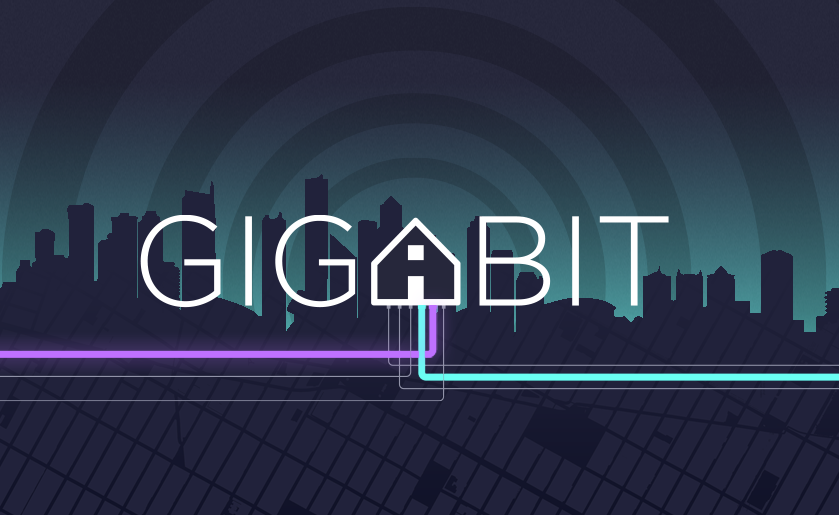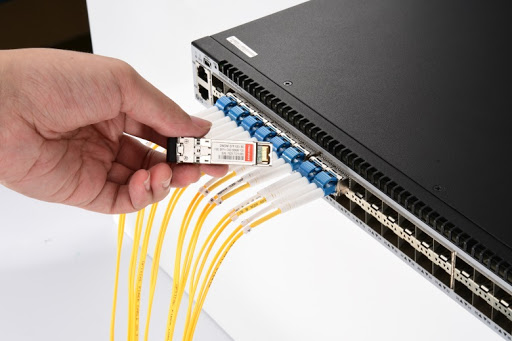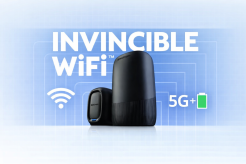What Is Gig-Speed Internet?

Any internet connection that can reach speeds of 1 Gbps or faster is referred to as gigabit internet. The data transmits at a rate of "gigabits" per second, hence the name "gigabit internet." One gigabit per second = 1,000 megabits per second (megabits per second).
When it comes to home internet networks, 1 Gbps is often the fastest speed available a from provider (ISP). Both Xfinity and Google Fiber offer 2 Gbps plans, although these are quite rare.
Fiber ISPs are the most common source of gigabit internet. Many cable companies can deliver gigabit download speeds, but upload speeds will be a fraction of that, typically in the 20–50 Mbps range. Fiber upload speeds are symmetrical, which means they're almost always the same as download speeds.You'll need an up-to-date router configured to the newest Wi-Fi standards in addition to a gigabit internet subscription to breach the 1 Gbps speed barrier.
Is it Worth the Money?
If you share your home Wi-Fi with a lot of people or spend a lot of time doing bandwidth-intensive things online, gigabit internet is well worth the money.
Long load times, excessive buffering, and other bandwidth-related problems are almost eliminated with a gigabit connection. A 1,000 Mbps or faster connection gives you enough speed to accommodate almost anything while still leaving enough capacity for whatever your friends or family members could be doing with your Wi-Fi.
If you simply reside with one or two other people and don't have any urgent internet needs, though, a slower plan will surely save you money. Many people will be able to stream videos, play online games, and Zoom with just a 100 Mbps internet connection.
What is the Difference Between Gigabit Internet and Fiber Internet
Gigabit internet and fiber are not the same thing. Fiber internet is a form of connection, whereas gigabit internet refers to the connection's speed.
Because most fiber-optic internet packages come in gigabit speeds—roughly 1,000 Mbps or faster—the phrases "fiber internet" and "gigabit internet" are frequently confused. However, in addition to gigabit bundles, some fiber internet providers provide lesser speeds at a reduced price. Gigabit download speeds are also available from several cable internet providers.
How Do You Know You Got The Best Gigabit Plan?
The 1 Gig plan from Google Fiber is the best gigabit internet plan available. It is reasonably priced, with a monthly fee of $70 that includes both equipment and installation. It gives you symmetrical speeds, which means your uploads and downloads will be the same pace. It also comes with unlimited data, so you can make the most of your gigabit speeds without having to worry about running out.
The majority of gigabit internet subscriptions go from $60 to $100 per month. If you're lucky, you might be able to get a gigabit internet package for a low price from a company like RCN. However, you might expect to pay more for gigabit internet speeds than usual.
Is Gigabyte Upload Possible?
Gigabit upload speeds are possible with fiber internet providers.
The only type of internet that can deliver gigabit uploads is fiber. You can achieve gigabit downloads from cable providers, but uploading will be much slower—usually around 20–50 Mbps.
You may not notice a difference because most internet users spend the majority of their time online downloading things (such as streaming, checking email, and downloading files). However, if you conduct a lot of upload-heavy activities like attending Zoom calls, hosting livestreams, or uploading files to Google Drive, strong upload speeds will come in useful.

Do You Need Gigabit Ethernet?
When you connect your device to an Ethernet connection on a router, you will get rapid speeds. Ethernet ports, often known as LAN (local area network) ports, are commonly seen on home routers. You can get a quicker and more direct internet connection by connecting your device to a router with an Ethernet cable.
Because your speeds may vary depending on a variety of circumstances, a gigabit Ethernet port may not always provide a gigabit connection. However, gigabit Ethernet is still the best option because it is far quicker than the earlier Ethernet standard, known as "fast Ethernet," which has a maximum speed of 100 Mbps.
Gaming Using Gigabit Internet
Because online gaming does not use a lot of data, you don't need gigabit internet rates to play games like League of Legends, Overwatch, or other popular titles. When you're gaming, however, you'll want a low-latency internet connection, so fiber is your best bet, even if it's not at gigabit speeds.
The brief delay that occurs when a signal travels from your device to the network and back—for example, when you press a button on your game controller or move your character with the joystick—is known as latency.
When you play fast-paced games like Call of Duty: Warzone, high latency causes lag, which causes delays and other issues. Out of all internet kinds, fiber internet has the lowest ping rate, followed by cable internet. You can also reduce latency by switching to a cable internet plan, removing unnecessary apps and browser tabs, or connecting your computer to your network directly through an Ethernet cable.
Looking for A Gigabyte Internet Plan?
Related Posts
 Internet Bundles
Broadband Deals
Subscription
mobile phone plans
Internet Bundles
Broadband Deals
Subscription
mobile phone plans
Metro by T-Mobile Add-Ons Explained: Hotspot, International Calling & More
Learn how Metro by T-Mobile add-ons work, including hotspot data, international calling, and device protection. Compare features and choose the right mobile extras.
 Internet Bundles
Internet Bundles
Facts About Youtube That May Surprise You
Discover updated YouTube facts, user statistics, revenue insights, and video trends shaping global content consumption and digital marketing strategies today.
 Internet Bundles
Broadband Installation
cheap internet deals
Internet Bundles
Broadband Installation
cheap internet deals
Simple Steps to Self-Install Spectrum Internet Fast: 2026 Guide
Learn how to self-install Spectrum Internet step-by-step. Save installation fees, activate service fast, and optimize WiFi performance with this complete guide.
 Internet Bundles
Internet Bundles
Why High-Speed Business Internet Matters More Than Ever
Discover why high-speed business internet drives productivity, security, and revenue growth, and how to choose the right provider for long-term success.
 Wifi
Technology
Wifi
Technology
Spectrum INVINCIBLE WiFi: Stay Connected During Outages
Discover how Spectrum INVINCIBLE WiFi combines WiFi 7, 5G backup, and battery protection to keep your home internet running during outages and disruptions.
